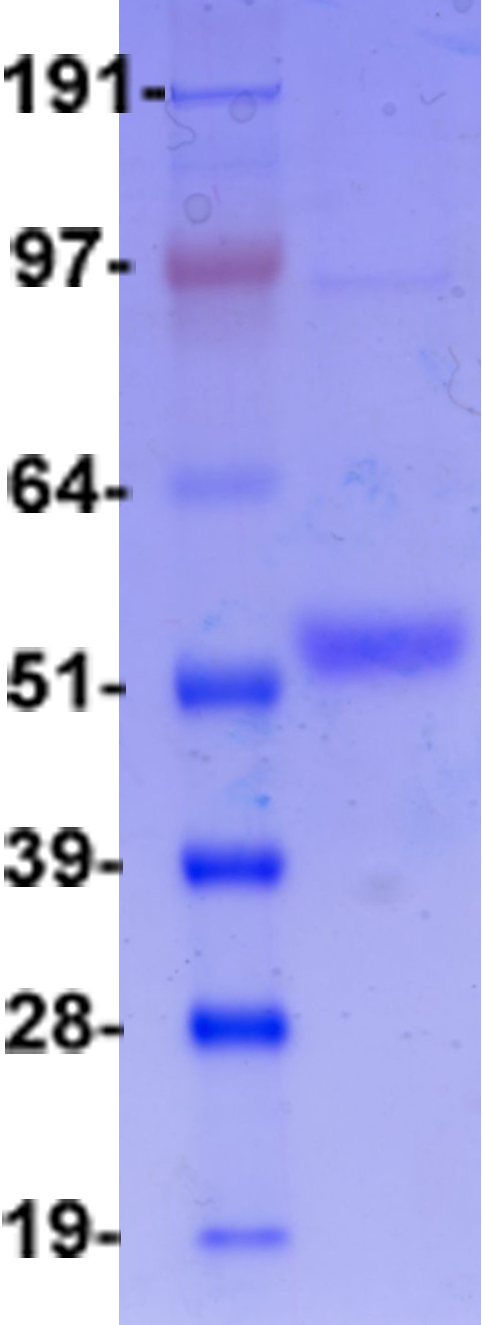TGF beta 3 (TGFB3) (NM_003239) Human Recombinant Protein
CAT#: TP314987L
Recombinant protein of human transforming growth factor, beta 3 (TGFB3), 1 mg
Frequently bought together (1)
Other products for "TGF beta 3"
Specifications
| Product Data | |
| Species | Human |
| Expression Host | HEK293T |
| Expression cDNA Clone or AA Sequence |
>RC214987 representing NM_003239
Red=Cloning site Green=Tags(s) MKMHLQRALVVLALLNFATVSLSLSTCTTLDFGHIKKKRVEAIRGQILSKLRLTSPPEPTVMTHVPYQVL ALYNSTRELLEEMHGEREEGCTQENTESEYYAKEIHKFDMIQGLAEHNELAVCPKGITSKVFRFNVSSVE KNRTNLFRAEFRVLRVPNPSSKRNEQRIELFQILRPDEHIAKQRYIGGKNLPTRGTAEWLSFDVTDTVRE WLLRRESNLGLEISIHCPCHTFQPNGDILENIHEVMEIKFKGVDNEDDHGRGDLGRLKKQKDHHNPHLIL MMIPPHRLDNPGQGGQRKKRALDTNYCFRNLEENCCVRPLYIDFRQDLGWKWVHEPKGYYANFCSGPCPY LRSADTTHSTVLGLYNTLNPEASASPCCVPQDLEPLTILYYVGRTPKVEQLSNMVVKSCKCS TRTRPLEQKLISEEDLAANDILDYKDDDDKV |
| Tag | C-Myc/DDK |
| Predicted MW | 44.7 kDa |
| Concentration | >0.05 µg/µL as determined by microplate BCA method |
| Purity | > 80% as determined by SDS-PAGE and Coomassie blue staining |
| Buffer | 25 mM Tris-HCl, 100 mM glycine, pH 7.3, 10% glycerol |
| Preparation | Recombinant protein was captured through anti-DDK affinity column followed by conventional chromatography steps. |
| Note | For testing in cell culture applications, please filter before use. Note that you may experience some loss of protein during the filtration process. |
| Storage | Store at -80°C. |
| Stability | Stable for 12 months from the date of receipt of the product under proper storage and handling conditions. Avoid repeated freeze-thaw cycles. |
| Reference Data | |
| RefSeq | NP_003230 |
| Locus ID | 7043 |
| UniProt ID | P10600, A5YM40, B3KVH9 |
| Cytogenetics | 14q24.3 |
| Refseq Size | 2574 |
| Refseq ORF | 1236 |
| Synonyms | ARVD; ARVD1; LDS5; RNHF; TGF-beta3 |
| Summary | This gene encodes a secreted ligand of the TGF-beta (transforming growth factor-beta) superfamily of proteins. Ligands of this family bind various TGF-beta receptors leading to recruitment and activation of SMAD family transcription factors that regulate gene expression. The encoded preproprotein is proteolytically processed to generate a latency-associated peptide (LAP) and a mature peptide, and is found in either a latent form composed of a mature peptide homodimer, a LAP homodimer, and a latent TGF-beta binding protein, or in an active form consisting solely of the mature peptide homodimer. The mature peptide may also form heterodimers with other TGF-beta family members. This protein is involved in embryogenesis and cell differentiation, and may play a role in wound healing. Mutations in this gene are a cause of aortic aneurysms and dissections, as well as familial arrhythmogenic right ventricular dysplasia 1. [provided by RefSeq, Aug 2016] |
| Protein Families | Druggable Genome, Secreted Protein, Transmembrane |
| Protein Pathways | Cell cycle, Chronic myeloid leukemia, Colorectal cancer, Cytokine-cytokine receptor interaction, Dilated cardiomyopathy, Hypertrophic cardiomyopathy (HCM), MAPK signaling pathway, Pancreatic cancer, Pathways in cancer, Renal cell carcinoma, TGF-beta signaling pathway |
Documents
| FAQs |
| SDS |
Resources
Recombinant Protein Resources |
{0} Product Review(s)
0 Product Review(s)
Submit review
Be the first one to submit a review
Product Citations
*Delivery time may vary from web posted schedule. Occasional delays may occur due to unforeseen
complexities in the preparation of your product. International customers may expect an additional 1-2 weeks
in shipping.






























































































































































































































































 Germany
Germany
 Japan
Japan
 United Kingdom
United Kingdom
 China
China


